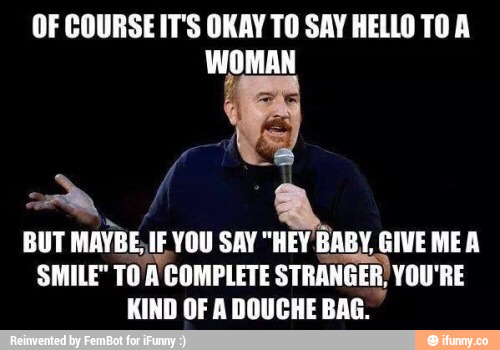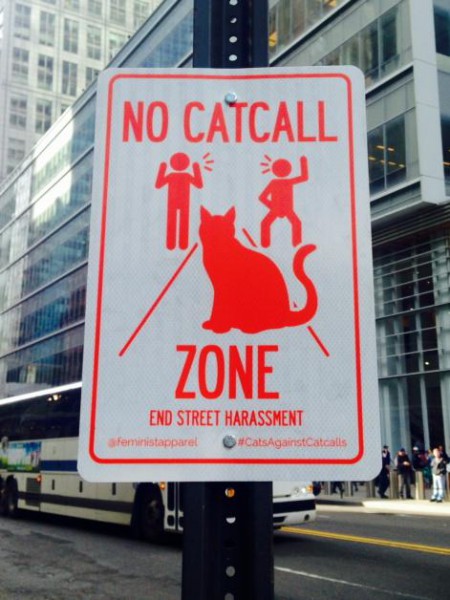If you are a runner who ventures outside, chances are good that, at least once, you have been catcalled.
For those unfamiliar with the term, catcalling is a peculiar phenomenon that occurs when one party (usually of the male variety, usually while driving) whistles, yells, cajoles, or otherwise attempts to engage the attention of another party (usually female and ambulatory). What, exactly, the offending party is hoping to gain from this interaction is unclear, but one can only assume that they are aiming for some sort of sexual gratification/affirmation of virility.
Joking aside, catcalls are a problem.
In the roughly thirteen years I’ve been running, I have had all manner of things yelled at me from car windows. These range from whistles to vague sex noises to an offer for a man to “lick the sweat off of me”. While running along a greenway in Raleigh, a stranger rolled down their window and implored a friend and me to “eat a doughnut, dammit!” Once while waiting to cross a street in Knoxville, a pair of teenage guys drove past and exclaimed “Oh shit – it’s a bitch” (presumably, I was initially mistaken for a boy due to short hair). And I’m not alone.
Here’s a choice smattering of phrases yelled at fellow runners:
“Run, bitch, run!”
“You’re an easy target!”
“Put some clothes on.”
“Nice ass.”
“Whatever you’re doing, it’s working!” This one to a fifteen-year-old girl by a man at least 25 years her senior.
Other friends tell tales of being slapped on the butt, having beer bottles thrown at them, or being solicited to get into a stranger’s car.
I find these incidents distressing for a number of reasons.
1. SOMEBODY CALL HR.
For professional runners, the roads are, essentially, our office. The catcallers in question are engaging in behavior that would be grounds for removal in a conventional office setting. But even if running isn’t your primary source of income, you shouldn’t have to worry about being harassed while doing something you enjoy. Nobody should. Which leads me to my next point.
2. I’M NOT HERE FOR YOU.
The vast majority of runners do not run in order to be noticed running. It’s not a display. It’s a passion.
Mid-run heckling is an issue that affects both men and women. When asked about their catcall experience, a couple of male friends reported being called a “faggot” or told to “put on a f*****g shirt”. Others had had things thrown at them, beer bottles being the preferred projectile (though one friend recounted being shot in the leg with a paintball. He didn’t break stride). However, the quality and frequency of heckling tends to vary according to gender. A recent Runner’s World poll of 2,533 women and 2,137 men found that 43 percent of women reported harassment on a regular basis, versus just 4 percent of men. So while men may have to put up with the occasional wolf whistle – which I don’t condone – lady-type runners are far more likely to get sexually explicit remarks.
Comments of this kind reinforce an underlying social assumption that by exposing an inch of skin (or daring to run in a public space) women are inviting strangers to critique our bodies. We’re not. I can’t speak to every woman’s experience, but I can confidently say that my female running friends and I would much rather be left to our own philosophical ramblings than worry about what some guy thinks of our (less than ample) cleavage.
“But wait,” runs one argument, “you shouldn’t be offended; you should be flattered. After all, someone is acknowledging that they think you’re attractive.”
“Let me be clear: a catcall is not a compliment. The implication is not “you are beautiful” – it’s “I want you”.
The key distinction here is agency. Catcalls send the message that you – as a runner, a woman, a person – are not the arbiter of your own worth. This random stranger is. They’ll tell you whether or not you’re attractive, regardless of whether you want their judgment. It removes a runner’s control over her own body in public spaces.
The technical term for this is objectification.
And objectification is dangerous, because objects can be owned. And stolen. And broken.
3. VIOLENCE INHERENT IN THE SYSTEM.
Here’s the thing: I don’t think most catcalls are meant to be threatening. But when, say, you’re a woman being yelled at by a man roughly twice your size, it’s impossible not to feel endangered. And unfortunately this type of fear isn’t unfounded.
When I was in college, a close friend and teammate of mine was assaulted on a run. She was on a well-established loop near campus in broad daylight. As she ran down the sidewalk, a man attempted to grab her. Luckily, survival instinct kicked in, and when she pulled back to punch the guy in the face, he let go. She left the encounter physically unscathed, but psychologically shaken.
Not all women can claim the same.
So even if that whistle is completely harmless, I for one am not going to stick around to find out.
Where does this leave us? Well, for drivers wondering whether they should yell something to the attractive person running down the sidewalk, the answer is no, probably not. The only circumstance under which this is permissible is if the runner is a close acquaintance with a forgiving sense of humor.
As for us runners, the best advice I can offer is to stay vigilant. Run in groups, learn some self-defense, maybe perfect your bottle-dodging skills. Don’t engage. Unfortunately, we can’t prevent stupid people from being stupid.
The best we can do is persist nevertheless.

